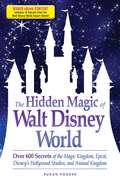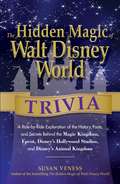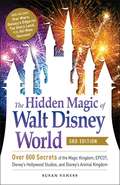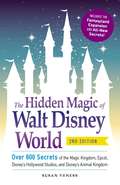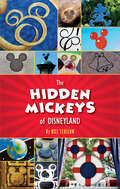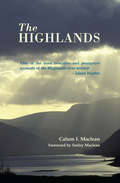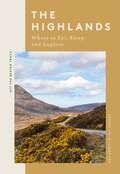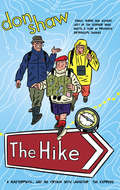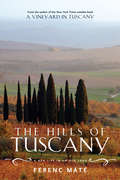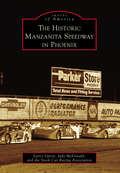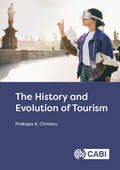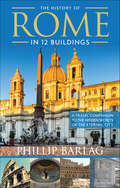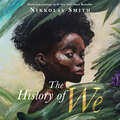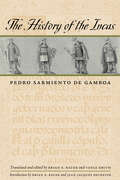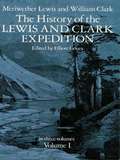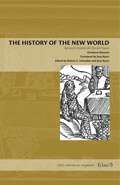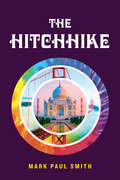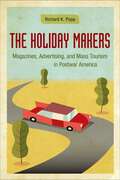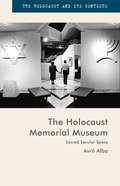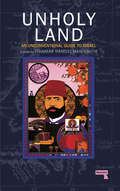- Table View
- List View
The Hidden Magic of Walt Disney World
by Susan VenessSure, it's the Happiest Place on Earth, but how much do the 45 million-plus people who visit the Disney World theme parks annually really know about it? From where to find all the hidden Mickeys to the truth behind Madame Leota's ring at the Haunted Mansion, learn all about the hidden magic that permeates these fabulous resorts in this tell-all handbook. Readers also get the insider's take on: The smell of home-baked cookies on Main Street in the Magic Kingdom The Fountain of World Friendship in Epcot that contains water from rivers and oceans around the globe Walt Disney's opening day speech tapped out in Morse Code in Frontierland The eco-friendly benches (recycled milk jugs) in the Animal Kingdom Two versions of The Great Movie Ride at Disney's Hollywood Studios Complete with secret tips from Disney's Imagineers, this book is the perfect in-park companion for Disney World fans.
The Hidden Magic of Walt Disney World Trivia
by Susan VenessTest your knowledge of Disney's little-known facts and history! You've been to Disney World hundreds of times and can rattle off the entire spiel for the Jungle Cruise from memory, but how much do you really know about these imaginative theme parks and their attractions? From the fastest rides and the tallest sculptures to the parks' enchanting history and hidden gems, this trivia challenge doesn't miss a single detail--no matter how small. Full of Disney's best-kept secrets and facts, you will spend hours racking your brain trying to figure out answers to questions such as, "What is the name of the award Walt Disney created for special Cast Members?" and "What is so special about the dentures Dr. Winch is promoting at Country Bear Jamboree?" A treasure trove of challenging Disney World trivia, this book is guaranteed to stump even the biggest Mickey Mouse fan!
The Hidden Magic of Walt Disney World Trivia: A Ride-by-Ride Exploration of the History, Facts, and Secrets Behind the Magic Kingdom, Epcot, Disney's Hollywood Studios, and Disney's Animal Kingdom
by Susan VenessTest your knowledge of Disney's little-known facts and history!You've been to Disney World hundreds of times and can rattle off the entire spiel for the Jungle Cruise from memory, but how much do you really know about these imaginative theme parks and their attractions? From the fastest rides and the tallest sculptures to the parks' enchanting history and hidden gems, this trivia challenge doesn't miss a single detail - no matter how small. Full of Disney's best-kept secrets and facts, you will spend hours racking your brain trying to figure out answers to questions such as, "What is the name of the award Walt Disney created for special Cast Members?" and "What is so special about the dentures Dr. Winch is promoting at Country Bear Jamboree?"A treasure trove of challenging Disney World trivia, this book is guaranteed to stump even the biggest Mickey Mouse fan!
The Hidden Magic of Walt Disney World, 3rd Edition: Over 600 Secrets of the Magic Kingdom, EPCOT, Disney's Hollywood Studios, and Disney's Animal Kingdom
by Susan VenessThe latest edition to the successful Hidden Magic series features updated information on the latest attractions at Walt Disney World, including Star Wars: Galaxy&’s Edge and Mickey and Minnie&’s Runaway Railway! Whether it&’s your first or fiftieth visit to Walt Disney World, you&’ll be surprised at how much you can miss during your trip. But with this guide to Disney&’s hidden treasures you&’ll learn: -You can search for more than the usual hidden Mickey. There are other beloved characters like Donald Duck and Minnie Mouse hidden around the parks. -The book Belle reads in Beauty and the Beast is a real book...and you can find out what it is by heading to Maurice&’s cottage. -Imagineers hide symbols of themselves around the park to &“sign&” their work. Including all-new information on Toy Story Land, Star Wars: Galaxy&’s Edge, and Mickey and Minnie&’s Runaway Railway, The Hidden Magic of Walt Disney World, 3rd Edition will inspire you to relive the magic year after year!
The Hidden Magic of Walt Disney World: Over 600 Secrets of the Magic Kingdom, Epcot, Disney's Hollywood Studios, and Animal Kingdom
by Susan VenessSure, it's the Happiest Place on Earth, but how much do the 45 million-plus people who visit the Disney World theme parks annually really know about it? From where to find all the hidden Mickeys to the truth behind Madame Leota's ring at the Haunted Mansion, learn all about the hidden magic that permeates these fabulous resorts in this tell-all handbook. Readers also get the insider's take on:The smell of home-baked cookies on Main Street in the Magic KingdomThe Fountain of World Friendship in Epcot that contains water from rivers and oceans around the globeWalt Disney's opening day speech tapped out in Morse Code in FrontierlandThe eco-friendly benches (recycled milk jugs) in the Animal KingdomTwo versions of The Great Movie Ride at Disney's Hollywood Studios Complete with secret tips from Disney's Imagineers, this book is the perfect in-park companion for Disney World fans.
The Hidden Magic of Walt Disney World: Over 600 Secrets of the Magic Kingdom, Epcot, Disney's Hollywood Studios, and Disney's Animal Kingdom (Disney Hidden Magic Gift Series)
by Susan VenessYour guide to Disney's hidden treasures--including Fantasyland and Storybook Circus secrets!Whether this is your first or fiftieth visit, you'd be surprised at how much you miss during your trip to Walt Disney World. From where to find hidden Imagineer signatures to the secrets behind the carriage numbers in the Casey Jr. Splash 'N' Soak play area, learn all about the hidden magic that permeates these fabulous resorts in this tell-all handbook. You will also get the insider's take on:The Disney family coat of arms standing guard at the entrance to Cinderella CastleThe surprise song that plays in the Seven Dwarfs Mine Train queue areaThe mysterious concentric circles in the Temple of Heaven in Epcot's China pavilionThe lipstick stain on the champagne glass sitting on the table in the Tower of Terror Complete with a whole new section on the Fantasyland and Storybook Circus expansion, The Hidden Magic of Walt Disney World, 2nd Edition will inspire you to relive the magic year after year!
The Hidden Mickeys of Disneyland (Disney Editions Deluxe)
by Bill ScollonWalt Disney was fond of saying, "I only hope that we never lose sight of one thing: that it was all started by a mouse." And so it is only appropriate that the mouse is incorporated into nearly every aspect of the Disney parks and resorts. In some cases, Mickey's presence is obvious—as in the Partners statue that stands in the center of the hub at the end of Main Street, U.S.A. But in other cases, Mickey's influence is a bit more hidden. . . . So what exactly is a Hidden Mickey? Quite simply, it's an artistic representation of Mickey that was intentionally placed amid the architecture and design of the parks and resorts. Oftentimes it's the familiar three-circle shape of his ears and head. Other times it might be a profile of his face or a full-body silhouette. Disneyland Guests with keen eyes can tell you that Mickey pops up all over the resort, often in the most unexpected places. With this resort wide scavenger hunt, you'll be guided toward each Hidden Mickey, first with a general hint—if you're up for a challenge—and then with a very specific clue. It's so much search-and-find fun, you might forget about your FastPass reservation for Big Thunder Mountain Railroad!
The Highlands
by Calum MacleanIn a new edition of this classic book, introduced by the world-renowned Gaelic poet Sorley Maclean, the late Calum I. Maclean, a Gaelic-speaking Highlander, interprets the traditional background, culture and ways of life of his native country. Calum's formal training in folk culture and the depth of his local knowledge make this book truly outstanding - it is written by a Highlander from the inside. Many books on the Highlands have been penned by outsiders with an uncritical appreciation of the scenery and only the most superficial knowledge of the Gaelic language and culture. By contrast, Maclean brought informed attitudes and sympathetic opinions. He was concerned not so much with places, beauty spots and scenery as with the Highlanders in their own self-created environment. He writes in terms of individuals and suggests reasons why Highland culture is unique in the world - it is something that, if lost, can never be recovered or recreated.
The Highlands: Where to Eat, Sleep and Explore (Off the Beaten Track)
by Meg AbbottOff the Beaten Track: The Highlands is a thoughtfully curated guide revealing the hidden joys of the Highlands, including where to eat well, explore and rest along the way. There are few places that leave their mark on you more than The Scottish Highlands. From pristine white-sand beaches and soaring mountains to thick pine forests, heathery peatlands and shimmering lochs, this is one of those rare places on Earth that seems to expand and grow more fascinating the longer you spend exploring it. Each chapter of this guide lays out a hand-picked selection of places to sample local flavours and find a home away from home in this beautiful region, as well as inspiration for activities that embrace the seasons. Whether you’re looking for breathtaking views from a day spent hiking, deep lochs for bathing, miles of rugged empty beach, the perfect pub for ale and oysters or a waterside eco bothy to switch off from the outside world, there’s something for everyone here.
The Hike
by Don ShawFreddy, Phil and Don are three grumpy old men, travelling at various speeds in the slow lane of retirement, at a loss to understand the mad modern world around them.Their chosen method of escape from all this is a shared weekly hike in the Peak District, come gale, hail, snow or torrential rain. They pass the time bumping into colourful and eccentric locals, but their real passion is bickering among themselves. Not only about the right path to take, but also about where they're all going at the fag end of life. Phil likes to dash up hills trying to beat his personal best, while Freddy plots how to sabotage him - teasing him at leisure and asking deep and difficult questions. Stuck in the middle, Don's only ambition is to stop the squabbling getting out of hand long enough to find a nice pub for lunch.As warm as the wind is cold, as dry as the lashing rain is wet, The Hike is a hilarious tale of bum-warmers, crayfish-fanciers, East German Trabant enthusiasts, bodger philosophers, sticky ginger cake, gorgeous countryside and the subtle art of 'onedownmanship'.
The Hills of Adonis: A Journey in Lebanon
by Colin ThubronThis is one man's search for an ancient myth in a country of the past. Walking through the mountains of Lebanon, Colin Thubron seeks the ancient gods of the country and describes his findings, which include a coastline of historic ports, some impressive ruins, natural scenery and a unique medley of people -- different again from the Lebanon of warfare and bloodshed that it has become in recent years.
The Hills of Rome: Signature of an Eternal City
by Caroline VoutRome is 'the city of seven hills'. This book examines the need for the 'seven hills' cliché, its origins, development, impact and borrowing. It explores how the cliché relates to Rome's real volcanic terrain and how it is fundamental to how we define this. Its chronological remit is capacious: Varro, Virgil and Claudian at one end, on, through the work of Renaissance antiquarians, to embrace frescoes and nineteenth-century engravings. These artists and authors celebrated the hills and the views from these hills, in an attempt to capture Rome holistically. By studying their efforts, this book confronts the problems of encapsulating Rome and 'cityness' more broadly and indeed the artificiality of any representation, whether a painting, poem or map. In this sense, it is not a history of the city at any one moment in time, but a history of how the city has been, and has to be, perceived.
The Hills of Tuscany: A New Life in an Old Land
by Ferenc Máté"Titanic in potential appeal . . . the Mátés do something rare; they go native."--Washington Post This hilarious, international bestseller is a true-life adventure of a New York City couple moving to Tuscany. Ferenc Máté's enthusiastic prose is infectious. He brings to life the real Tuscany: the contadini neighbors, country life--the harvest, grape, and olive picking, wine making, mushroom hunting, woodcutting--the holidays, and of course the never-ending, mouthwatering meals.
The Historic Manzanita Speedway in Phoenix (Images of America)
by Larry Upton Stock Car Racing Association Judy McdonaldPhoenix's Manzanita Speedway, the last of the big dirt tracks located near the central corridor of a major metropolitan area, is now gone. The track opened in the early 1950s when Jack Holloway, president of the Arizona Jalopy Racing Association, along with Avery Doyle and Gene Gunn, set about convincing Rudy Everett and Larry Meskimen to convert their unprofitable dog-racing operation into a quarter-mile dirt track. On August 25, 1951, Everett and Meskimen beamed with excitement as Manzy opened to an overflowing crowd. They had tapped into America's post-World War II craze for automobiles and found their own Lost Dutchman Gold Mine in the process. Manzanita Speedway dominated dirt-track racing in Phoenix and was heralded as one of the top five dirt tracks in the United States. Manzy became an integral part of the racing culture in Phoenix, and its sale and closure in 2009 created a sense of lingering disappointment.
The History and Evolution of Tourism
by Dr Prokopis A ChristouThis book provides an overview of the history and evolution of tourism to the present, and speculates on possible and probable change into the future. It discusses significant travel, tourism and hospitality events while referring to tourism-related notions and theories that have been developed since the beginnings of tourism. Its scope moves beyond a comprehensive historical account of facts and events. Instead, it bridges these with contemporary issues, challenges and concerns, hence enabling readers to connect tourism past with the present and future. This textbook aspires to enhance readers' comprehension of the perplexed system of tourism, promoting decision-making and even the development of new theories. Despite its academic orientation, the book is written in an approachable style enabling a clear and solid understanding of how tourism has evolved through the centuries. It uses several practitioner-linked, real-life examples and case studies derived from organizations and enterprises across all aspects of the tourism, travel and events industries. This book will be of great interest to academics, practitioners and students from a wide variety of disciplines, including tourism, hospitality, events, sociology, psychology, philosophy, history and human geography.
The History of Rome in 12 Buildings: A Travel Companion to the Hidden Secrets of The Eternal City
by Phillip BarlagAny travel guide to Rome will urge visitors to go the Colosseum, but none answers a simple question: Why is it called the Colosseum?The History of Rome in 12 Buildings: A Travel Companion to the Hidden Secrets of The Eternal City is compelling, concise, and fun, and takes you behind the iconic buildings to reveal the hidden stories of the people that forged the Roman Empire.Typical travel guides provide torrents of information but deny their readers depth and perspective. In this gap is the really good stuff--the stories that make the buildings come alive and vividly enhance any trip to Rome.The History of Rome in 12 Buildings will immerse you in the world of the Romans, one full of drama, intrigue, and scandal. With its help, you will be able to trace the rise and fall of the ancient world's greatest superpower:Find the last resting spot of Julius Caesar.Join Augustus as he offers sacrifices to the gods.Discover the lie on the façade of the Pantheon.Walk in the footsteps of Jesus.And so much more.
The History of We
by Nikkolas SmithAn awe-inspiring picture book about the origin and advancement of humans, from author and #1 New York Times bestselling illustrator Nikkolas Smith.Fossil records show that the first humans were born in Africa. Meaning, every person on Earth can trace their ancestry back to that continent. The History of We celebrates our shared ancestors' ingenuity and achievements and imagines what these firsts would have looked and felt like.What was it like for the first person to paint, to make music, to dance, to discover medicine, to travel to unknown lands? It required courage, curiosity, and skill. The History of We takes what we know about modern human civilization and, through magnificent paintings, creates a tale about our shared beginnings in a way that centers Black people in humankind's origin story.
The History of the Incas (Joe R. and Teresa Lozano Long Series in Latin American and Latino Art and Culture)
by Translated Pedro Sarmiento de Gamboa edited by Brian S. Bauer Vania SmithThe History of the Incasmay be the best description of Inca life and mythology to survive Spanish colonization of Peru. Pedro Sarmiento de Gamboa, a well-educated sea captain and cosmographer of the viceroyalty, wrote the document in Cuzco, the capital of the Inca Empire, just forty years after the arrival of the first Spaniards. The royal sponsorship of the work guaranteed Sarmiento direct access to the highest Spanish officials in Cuzco. It allowed him to summon influential Incas, especially those who had witnessed the fall of the Empire. Sarmiento also travelled widely and interviewed numerous local lords (curacas), as well as surviving members of the royal Inca families. Once completed, in an unprecedented effort to establish the authenticity of the work, Sarmiento's manuscript was read, chapter by chapter, to forty-two indigenous authorities for commentary and correction. The scholars behind this new edition (the first to be published in English since 1907) went to similarly great lengths in pursuit of accuracy. Translators Brian Bauer and Vania Smith used an early transcript and, in some instances, the original document to create the text. Bauer and Jean-Jacques Decoster's introduction lays bare the biases Sarmiento incorporated into his writing. It also theorizes what sources, in addition to his extensive interviews, Sarmiento relied upon to produce his history. Finally, more than sixty new illustrations enliven this historically invaluable document of life in the ancient Andes.
The History of the Lewis and Clark Expedition, Vol. 1
by Elliott Coues Lewis ClarkVolume 1 of the classic edition of Lewis and Clark's day-by-day journals that later became the basis for U.S. claims to Oregon and the West. Accurate and invaluable geographical, botanical, biological, meteorological, and anthropological material. Complete 1893 edition, edited by Elliott Coues from Biddle's authorized 1814 history.
The History of the New World: Benzoni's Historia del Mondo Nuovo (Latin American Originals #11)
by Girolamo Benzoni Jana Byars Robert C. SchwallerThe History of the New World is an abridged, unique English translation of sixteenth-century Italian merchant Girolamo Benzoni’s popular account of his adventures in the Americas and the Spanish colonies.First published in Venice in 1565, Benzoni’s book was an immediate best seller and available in at least five languages before the end of the century. It spanned the years 1541–56, providing detailed descriptions of native flora and fauna, exciting narration of harrowing exploits, and a surprisingly critical perspective on the expanding Spanish Empire’s methods of conquest and governance, in which Benzoni highlighted the struggles of indigenous peoples. This edition follows the three-book structure of the original account but focuses on Benzoni’s own experiences, omitting episodes to which he was not a witness and excising repetition and hyperbolic hearsay. The first English-language version published since 1847, this volume includes an informative introduction and annotations that situate Benzoni and his fascinating writings in the larger context of Spanish colonial conquest. Perfect for classroom use, this is a lively, vivid firsthand account of the adventure and wonder of the New World.
The Hitchhike
by Mark Paul SmithMark Paul Smith's hitchhike from Indiana to India in 1972 changed him from being an Air Force Officer into a conscientious objector. He hitchhiked through the Iron Curtain and worked on a collective farm in Hungary only to find that communism wasn't our real enemy. He met people from North Vietnam who showed him the real enemy was the U.S. war machine. Being an American was popular in those days, but the people of the world showed Smith kindness and kept him alive when he ran out of money. The long road to decision showed him that people everywhere want peace, not war. His faith in the United States of America was restored when he sued the government and won his case in federal court.
The Holiday Makers: Magazines, Advertising, and Mass Tourism in Postwar America
by Richard K. PoppIn mid-twentieth-century America, mass tourism became emblematic of the expanding horizons associated with an affluent, industrial society. Nowhere was the image of leisurely travel more visible than in the parade of glossy articles and advertisements that beckoned readers from the pages of popular magazines. In Richard K. Popp's The Holiday Makers, the magazine industry serves as a window into postwar media and consumer society, showing how the dynamics of market research and commercial print culture helped shape ideas about place, mobility, and leisure. Magazine publishers saw travel content as a way to connect audiences to a booming ad sector, while middlebrow editors believed sightseeing travel was a means of fostering a classless society at home and harmony abroad. Expanding transportation networks and free time lay at the heart of this idealized vision. Holiday magazine heralded nothing less than the dawn of a new era, calling it "the age of Mobile Man -- Man gifted, for the first time in history, with leisure and the means to enjoy distance on a global scale." For their part, advertisers understood that selling tourism meant turning "dreams into action," as ad executive David Ogilvy put it. Doing so involved everything from countering ugly stereotypes to tapping into desires for "authentic" places and self-actualization. Though tourism was publicly touted in egalitarian terms, publishers and advertisers privately came to see it as an easy way to segment the elite free spenders from the penny-pinching masses. Just as importantly, marketers identified correlations between an interest in travel and other consumer behavior. Ultimately, Popp contends, the selling of tourism in postwar America played an early, integral role in the shift toward lifestyle marketing, an experiential service economy, and contributed to escalating levels of social inequality.
The Holocaust Memorial Museum: Sacred Secular Space (The Holocaust and its Contexts)
by Avril AlbaThe Holocaust Memorial Museum reveals and traces the transformation of ancient Jewish symbols, rituals, archetypes and narratives deployed in these sites. Demonstrating how cloaking the 'secular' history of the Holocaust in sacred garb, memorial museums generate redemptive yet conflicting visions of the meaning and utility of Holocaust memory.
The Holy City of Medina
by Harry MuntThis is the first book-length study of the emergence of Medina, in modern Saudi Arabia, as a widely venerated sacred space and holy city over the course of the first three Islamic centuries (the seventh to ninth centuries CE). This was a dynamic period that witnessed the evolution of many Islamic political, religious and legal doctrines, and the book situates Medina's emerging sanctity within the appropriate historical contexts. The book focuses on the roles played by the Prophet Muḥammad, by the Umayyad and early Abbasid caliphs and by Muslim legal scholars. It shows that Medina's emergence as a holy city, alongside Mecca and Jerusalem, as well as the development of many of the doctrines associated with its sanctity, was the result of gradual and contested processes and was intimately linked with important contemporary developments concerning the legitimation of political, religious and legal authority in the Islamic world.
The Holy Land: Contemporary Visions and Scriptures
by Ithamar Handelman SmithA collection of photographic and written essays about the place some have described as the most fought-over parcel of land in human history. Contemporary Visions and Scriptures seeks dialogue with the ancient lands and modern visions of the people who inhabit these sacred spaces, and the burgeoning contradictions of their daily lives, furthermore it attempts to address and liberate a complex, profound relationship between man and territory since the beginning of time, and nowhere is this dynamic more prescient than in the Holy Land.
